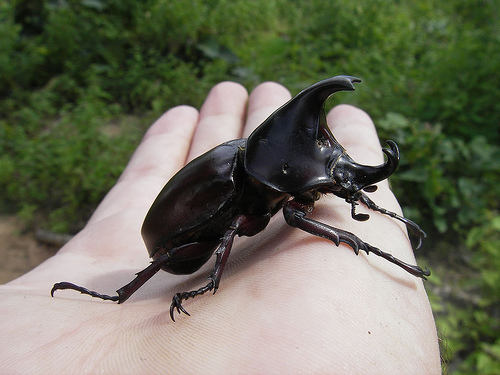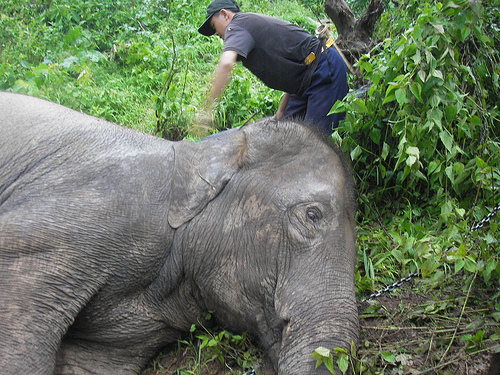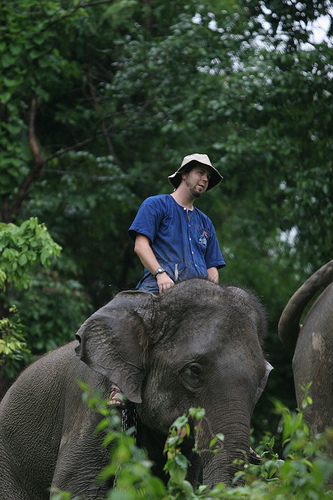education
Should We Be Riding Elephants in Thailand?
Among travelers to
Should we be riding around on elephants? Isn’t the elephant being exploited? Is it inhumane for elephants to be used for tourism?
Of course we all wish the elephants could live in the wild and be undisturbed by humans. However, for about the last 4500 years, elephants have been captured, domesticated and used for transportation, labor and even warfare. For thousands of years, the elephant has been living with and around humans and over that time we humans have learned the requirements for ensuring that the relationship is stable and productive. One of the outgrowths of these years of domestication is the role of mahout, which is the elephant’s trainer- an essential and vital role for the elephant and human. For the last three days, I learned a little about being a mahout and his relationship with the elephant. These are mahouts with their elephants at the Thai Elephant Conservation Center:

The mahout has a unique relationship with the elephant- one that can last decades. When an elephant is born into domestication, it is assigned a mahout who will be responsible for the elephant for the mahout’s whole life. In fact, some elephants outlive their mahouts (elephants can live 80+ years) and the elephant is then often passed down to the mahout’s son. As you might imagine, a strong bond develops between the mahout and the elephant that goes beyond trainer and animal. When I asked about the nature of the relationship, it was described as companionship. The elephant seeks the company of the mahout and feels at home with the mahout on his back- they are a lifelong team.
As I experienced, the relationship is not one purely of hugs and treats. As dog owners know, a dog seeks to be the alpha (dominant) dog in the family and if it perceives that it has reached this role, it will become less trainable and try to dominate the humans. The same basic idea is true with the elephants. The mahout must maintain a relationship with the elephant that ensures that the elephant is not dominant, but submissive to the mahout. A dominant elephant can be lethal.
How do you dominate an elephant? Unfortunately, is partially through pain, or at least the threat of pain. Elephants are incredible heavy, strong, willful and tough animals. In order for the mahout to be able to train the elephant, he must have some way to send positive and negative messages. Along with voice commands and touching, the tool of choice for mahouts is an ominous looking pointed metal hook called an ankus. This hook is used to guide the elephant and to correct poor behavior. Though it seems a bit barbaric to the layperson, this evolved over many years and ensures that the elephant and mahout have mutual respect.

For hundreds of years in
Today, many elephants have found a new home by working in the eco-tourism industry. Elephants that are sufficiently trained and mild-mannered can now be supported through tourism. By offering rides through the jungle, elephant shows and elephant education, the mahouts and their elephants can support themselves without the logging industry. For many elephants, working conditions are greatly improved and as more tourists come to
The
So, to return to the original questions…
Should we be riding around on these animals? Isn’t the elephant being exploited? Is it inhumane for elephants to be used for tourism?
Of course, this is a personal decision. I realize that many readers will not ride an elephant on principle alone. However, I hope that I’ve provided information here that illustrates a bit of the complex circumstances of the elephants in
3 Day Mahout Training, Thai Elephant Conservation Center
I return from 3 days of learning about elephant training more of an elephant lover and with more mixed feelings about the life of the domestic elephant.
The Thai Elephant Conservation Center offers a multi-day mahout training course that enables a tourist to live at the center for 3 days to learn about elephants and elephant training, their relationship with their trainer (the mahout) and general elephant/mahout life. The course includes accommodation for 2 nights, 5 meals and all instruction for about $125. Below is one day in the mahout training program.











The experience at the
Though they are very well cared-for at the center, their size and potential for destruction requires that they lead a life in bondage- chained to a tree or the floor consistenly. Being domesticated from birth, this lifestyle is a reality to the elephant in the way that a dog is kept in a kennel or a rabbit in a cage. I left with the feeling that the elephants at the center are quite happy, but there are many in the country (and world) that are not so happy and it pains me to think of the life they lead. Thankfully, organizations like the
See Also: Should We Be Riding Around On Elephants in Thailand?




Recent comments
1 week 4 days ago
2 weeks 2 days ago
3 weeks 5 days ago
7 weeks 1 hour ago
7 weeks 5 days ago
17 weeks 4 days ago
17 weeks 4 days ago
18 weeks 1 day ago
19 weeks 4 days ago
19 weeks 4 days ago